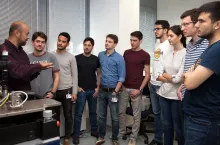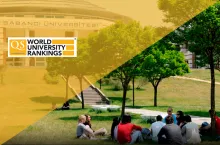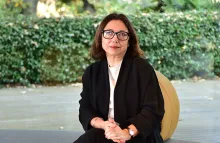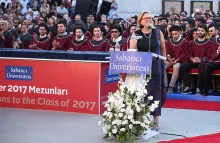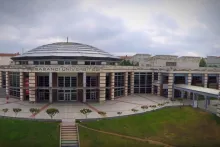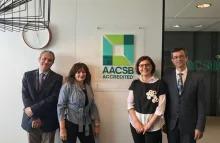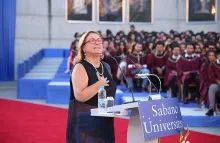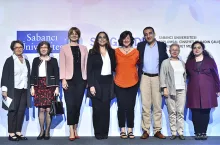Sabancı University Founding Board of Trustees Chair Güler Sabancı speaking at the Sabancı University Commencement Ceremony:
- You will live to be 100. You must develop and plan your resources for a life of 100 years.
- In an age when humanoid robots are being built, you must avoid becoming roboticized humans!
- Make your feelings an integral part of your thinking and reasoning.
- Your consciousness and conscience will be your greatest advantages in competition.
- One common feature of all successful people is their perspective on life.
- Regardless of what job you do, you must love it and want to do it. Your measure of success cannot be money alone.
- True wealth and true success is the positive effect we have on people's lives.

900 students from 30 countries received their degrees at the 18th Graduate and 15th Undergraduate Commencement Ceremony held on the Sabancı University campus.
On Saturday, July 1st, 2017, Sabancı University held the commencement ceremony for its 18th graduate and 15th undergraduate classes. Graduates received their diplomas at a ceremony on the Tuzla campus of the university, attended by over 6000 people. The top ranking students of the three faculties also received their awards. Winners were Fulya Türker in the Faculty of Engineering and Natural Sciences, Lina Meija Peroni in the Faculty of Arts and Social Sciences, and Elif Ertürk in the School of Management. Among Sabancı University graduates this year were students from 30 countries.
Speaking in the ceremony were Sabancı University Founding Board of Trustees Chair Güler Sabancı and President Professor Ayşe Kadıoğlu as well as Gökçe Karşılıklı Haliler on behalf of graduate students, Tanra Gürçay on behalf of undergraduate students, and Sabancı University Alumni Association President Zeynep Bahar Çelik.
You must constantly develop your resources of knowledge and competency, and plan yourself for a life of 100 years
Güler Sabancı began by saying: “You are at an important turning point for your lives ahead of you. You have worked and you have succeeded in completing a difficult phase. A new era begins today, and I wish you all success in it."
Sabancı added that while having talent, competence and knowledge was the start of the road to success, luck also played a part in it. Reminding Louis Pasteur's words "Fortune favors the prepared mind", Güler Sabancı said that the graduates of Sabancı University were already prepared.
Güler Sabancı said that the transformative effects of science and technology, from artificial intelligence to robots, were felt in every aspect of our lives, and extended the average life expectancy of humans. She emphasized the need to make longer-term plans compared to previous generations. Sabancı said, "You must constantly develop your resources of knowledge and competency, and plan yourself for a life of 100 years."
Sabancı explained that while in the agricultural society one could live a lifetime on the knowledge they inherited from their parents only, and going to university was enough for finding a good job and cruising until a comfortable retirement in the industrial age, no school could give the knowledge an individual will need until the end of their life today. Güler Sabancı expressed her confidence that, since the knowledge and competencies taught in schools could only be foundations for people's careers in business, graduates would find their ways back to Sabancı University in the future.
Güler Sabancı added that today's graduates would work for more than 50 years, having enough time for 2 or 3 different careers, and considering the wealth of experiences that would bring, it was impossible to transfer an exhaustive body of advice or experience to the younger generations.

One common feature of all successful people is their perspective on life
Güler Sabancı said that all successful people had a common feature, which was their perspective on the world. Sabancı continued: "They consult, they question, they inquire, they do their homework and approach things with an open mind; they are constructive and solution-oriented, they plan their resources well, and they focus on getting results. Most important of all, successful people always strive to improve the capabilities and possibilities given to them."
Güler Sabancı remarked, “This perspective also includes being open to learning, enthusiastic to reinvent or develop oneself, and being diverse in capabilities. There is also the propensity to view life as a journey in learning, development and maturation, where one always develops and goes further. Because they know one thing very well: what matters is not what you have today, but what you choose to do with it."
Continuing "What you encounter is less important than how you handle it," Güler Sabancı said: "If you look at life with a mindset that is focused on development, you can go beyond what has been provided to you. Remember that your success and happiness will be defined by how you build on top of what you have today. The good news is that you have been raised at Sabancı University with the necessary competencies and this mindset."
We aimed to equip our students with a development-focused mindset
Emphasizing that Sabancı University aims to help its students acquire a mindset that is focused on development, Sabancı said that students at Sabancı University did not merely learn a science or a profession, but were raised to become individuals who adopt universal values such as human rights, equality and rule of law, have common sense, believe in the power of knowledge, and manage their feelings with conscience and consciousness. She underlined the focus on "learning to learn" at Sabancı University. Güler Sabancı continued: “The values and competencies you have acquired here will light your way in whatever path in life that you will follow."
In an age when humanoid robots are being built, you must avoid becoming roboticized humans!
Güler Sabancı said “We can see even today that artificial intelligence will transform work and business as we know it, and will shake the roots of social equilibrium. We can foresee that in 20 years, many of the professions and jobs available today will be done by robots, or learning machines."
Explaining that emotions set sentient beings apart from robots, Güler Sabancı said that what set humans apart from other species was their awareness of emotions and their ability to manage them. That, according to Sabancı, was the reason why no robot or artificial intelligence was able to replace human consciousness. Sabancı said, "In an age when humanoid robots are being built, you must avoid becoming roboticized humans"
and gave advice to new graduates:
- "In the new social order that awaits you, you must be aware of your emotions and work on how to manage them.
- Make your feelings an integral part of your thinking and reasoning.
- Your consciousness and conscience will be your greatest advantages in competition.
- At this stage, my advice is regardless of what job you do, you must love it and want to do it.
- Your measure of success cannot be money alone.
- To do this, the work you do should have a purpose that goes beyond it.
- Money is of course important, and every human is entitled to enjoy the comforts of life, but none of those are the true measures of success in one's life.
- People remember you not by how much money you make, but how you spend it.
- I will also recommend the book 'Başarı Şimdi Aslanın Ağzında' by the late Sakıp Sabancı.
- As we say our goodbyes, there is one thing I want you to remember: 'True wealth and true success is the positive effect we have on people's lives.'"
“We keep building bridges”
President Ayşe Kadıoğlu said that in nearly 20 years of education, Sabancı University brought a fresh perspective to higher education in Turkey with its pioneering and innovative endeavors. Ayşe Kadıoğlu continued, “We are the first university in Turkey that allowed its students to enroll to a faculty and later make well-informed choices about their diploma programs, and we have set an example to other universities in Turkey."

Referring to the Composites Center established last year in an impressive university-industry partnership, Kadıoğlu said that other centers working in collaboration with different institutions made great contributions to research and education. She added that the first English-language PhD program in gender studies in Turkey would begin in September under the guidance of the Gender and Women's Studies Center of Excellence. Kadıoğlu continued, "I would like to share some good news that is of interest to us all: we have begun work on opening a new location, Sabancı University Maçka. We intend to create connections and develop new ways of cooperation there. We are also working towards establishing a Sakıp Sabancı Chair and Center in Turkish Studies at Columbia University. We will keep building bridges."
"Sabancı University has always favored freedom over free rein"
Ayşe Kadıoğlu said that a diploma was the certification of an ending, continuing, "Regardless of how important that ending is, the means or the process that took us to that end matter more. The adventurous journey of learning and knowledge holds just as much, if not more, meaning as the end." Kadıoğlu stated that it was through this process that students acquired some values unique to Sabancı University.
"Knowledge may not free the body all the time, but it frees the mind"
Ayşe Kadıoğlu spoke, “First and foremost, Sabancı University alumni know exactly what freedom is. There is a great difference between freedom and free rein. Since established, Sabancı University has favored freedom and informed choices over free rein. Knowledge may not free the body all the time, but it frees the mind. And you graduate today as free minds who know the difference between being free and doing as you please."
Kadıoğlu continued, “Secondly, it has always been our priority to stand against all discrimination and respect all differences. I am sure that you will do your part for a better country and a better world by upholding these values in your everyday lives."
Ayşe Kadıoğlu said that students met scientific thought for the first time in Sabancı University, continuing, "What makes a thought scientific is its being open to verification; this requires being receptive to criticism and the coexistence of self-confidence and humility."
Ayşe Kadıoğlu concluded by saying: “Criticism is not about destruction; it is about construction. Make sure that your critical thinking has a constructive side to it. You are capable of doing this because you are Sabancı University graduates."
Gürsel Sönmez Awards presented to 3 graduates
Awards in honor of the late Sabancı University Faculty Member Gürsel Sönmez, who passed away in 2006, were presented at the ceremony. This year's Dr. Gürsel Sönmez Research Award recipients were Physics PhD graduate Tolga Çağlar, Industrial Engineering master's graduate Rebi Daldal and Mathematics master's graduate Seyyed Hamed Mousavi.
Hat-tossing was followed by live music and dance shows by Ayhan Sicimoğlu. Sabancı University Founding Board of Trustees Chair Güler Sabancı joined the dance to share the excitement of graduation with the students.


